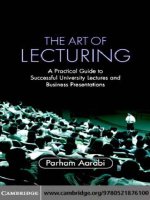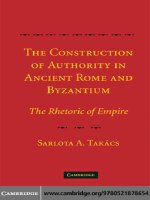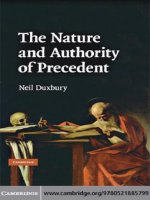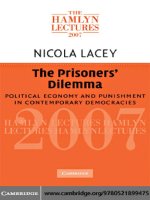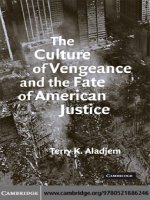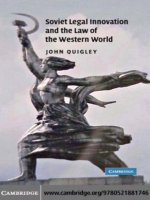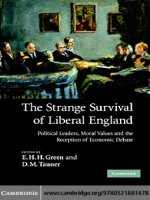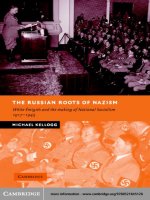0521866383 cambridge university press the lake poets and professional identity sep 2007
Bạn đang xem bản rút gọn của tài liệu. Xem và tải ngay bản đầy đủ của tài liệu tại đây (1.24 MB, 307 trang )
This page intentionally left blank
THE LAKE POETS AND PROFESSIONAL
IDENTITY
The idea that the inspired poet stands apart from the
marketplace is considered central to British Romanticism.
However, Romantic authors were deeply concerned with how
their occupation might be considered a kind of labor comparable to that of the traditional professions. In the process of
defining their work as authors, Wordsworth, Southey, and
Coleridge – the ‘‘Lake school’’ – aligned themselves with
emerging constructions of the ‘‘professional gentleman’’ that
challenged the vocational practices of late eighteenth-century
British culture. They modeled their idea of authorship on the
learned professions of medicine, church, and law, which
allowed them to imagine a productive relationship with the
marketplace and to adopt the ways eighteenth-century poets
had related their poetry to other kinds of intellectual work.
Brian Goldberg explores the ideas of professional risk, evaluation, and competition that the writers developed as a
response to a variety of eighteenth-century depictions of the
literary career.
brian goldberg is Associate Professor of English at the
University of Minnesota.
cambridge studies in romanticism
General Editors
Professor Marilyn Butler, University of Oxford
Professor James Chandler, University of Chicago
Editorial Board
John Barrell, University of York
Paul Hamilton, University of London
Mary Jacobus, University of Cambridge
Claudia Johnson, Princeton University
Alan Liu, University of California, Santa Barbara
Susan Manning, University of Edinburgh
Jerome McGann, University of Virginia
David Simpson, University of California, Davis
This series aims to foster the best new work in one of the most challenging
fields within English literary studies. From the early 1780s to the early 1830s
a formidable array of talented men and women took to literary composition,
not just in poetry, which some of them famously transformed, but in many
modes of writing. The expansion of publishing created new opportunities
for writers, and the political stakes of what they wrote were raised again by
what Wordsworth called those ‘‘great national events’’ that were ‘‘almost
daily taking place’’: the French Revolution, the Napoleonic and American
wars, urbanization, industrialization, religious revival, an expanded empire
abroad, and the reform movement at home. This was an enormous ambition, even when it pretended otherwise. The relations between science,
philosophy, religion, and literature were reworked in texts such as Frankenstein and Biographia Literaria; gender relations in A Vindication of the Rights
of Woman and Don Juan; journalism by Cobbett and Hazlitt; poetic form,
content, and style by the Lake School and the Cockney School. Outside
Shakespeare studies, probably no body of writing has produced such a
wealth of response or done so much to shape the responses of modern
criticism. This indeed is the period that saw the emergence of those notions
of ‘‘literature’’ and of literary history, especially national literary history, on
which modern scholarship in English has been founded. The categories
produced by Romanticism have also been challenged by recent historicist
arguments. The task of the series is to engage both with a challenging
corpus of Romantic writings and with the changing field of criticism they
have helped to shape. As with other literary series published by Cambridge,
this one will represent the work of both younger and more established
scholars, on either side of the Atlantic and elsewhere.
For a complete list of titles published see end of book.
THE LAKE POETS
AND PROFESSIONAL
IDENTITY
BRIAN GOLDBERG
CAMBRIDGE UNIVERSITY PRESS
Cambridge, New York, Melbourne, Madrid, Cape Town, Singapore, São Paulo
Cambridge University Press
The Edinburgh Building, Cambridge CB2 8RU, UK
Published in the United States of America by Cambridge University Press, New York
www.cambridge.org
Information on this title: www.cambridge.org/9780521866385
© Brian Goldberg 2007
This publication is in copyright. Subject to statutory exception and to the provision of
relevant collective licensing agreements, no reproduction of any part may take place
without the written permission of Cambridge University Press.
First published in print format 2007
eBook (EBL)
ISBN-13 978-0-511-34144-1
ISBN-10 0-511-34144-X
eBook (EBL)
hardback
ISBN-13 978-0-521-86638-5
hardback
ISBN-10 0-521-86638-3
Cambridge University Press has no responsibility for the persistence or accuracy of urls
for external or third-party internet websites referred to in this publication, and does not
guarantee that any content on such websites is, or will remain, accurate or appropriate.
Contents
Acknowledgments
page vii
Introduction: Professionalism and the Lake School
of Poetry
Part I
1
Romanticism, risk, and professionalism
Cursing Doctor Young, and after
Part II
1
27
Genealogies of the romantic wanderer
2
Merit and reward in 1729
63
3
James Beattie and The Minstrel
90
Part III
Romantic itinerants
4
Authority and the itinerant cleric
125
5
William Cowper and the itinerant Lake poet
166
Part IV
The Lake school, professionalism, and the public
6
Robert Southey and the claims of literature
193
7
‘‘Ministry more palpable’’: William Wordsworth’s
romantic professionalism
215
232
271
289
Notes
Bibliography
Index
v
Acknowledgments
It gives me great pleasure to thank the many people who contributed to the writing of this book. The teaching and scholarly
energy of Charlotte Zoe Walker and Patricia Gourlay, two professors at SUNY-Oneonta, have been an ongoing source of
inspiration since I was first introduced to literary study in their
classrooms. At Northeastern University, Stuart Peterfreund provided an enduring, admirable model of Romantic scholarship.
For subsequent acts of kindness and intellectual generosity, I am
also indebted to William H. Buchholz and Bruce Herzberg at
Bentley College; Charles Rzepka; and Herbert Tucker. Colleagues at the University of Washington were invariably helpful
during my time there, and I am especially grateful for the conversation of Jane Brown, Henry Staten, and Raimonda Modiano.
At the University of Minnesota, thanks are due to Shirley Nelson
Garner, Michael Hancher, and Gordon Hirsch. John Watkins has
been an especially supportive and stimulating presence.
Two anonymous readers at Cambridge University Press gave
more good advice than I have been able to follow, and I am
deeply grateful for the generosity of the editors of the series,
Marilyn Butler and James Chandler, and for the help and
patience of Linda Bree and Maartje Scheltens. Also at Cambridge
University Press, this project has benefited greatly from the help
and attention of Rosina Di Marzo and Sara Barnes. Versions of
this manuscript were read by Stephen Behrendt, Stuart Curran,
William Galperin, Marilyn Gaull, Nancy Moore Goslee, Jon
Klancher, and Peter Manning – in some cases, opposition has
proved to be true friendship; in all cases, I am thankful for the
valuable insights of these scholars.
A version of Chapter Six has appeared as ‘‘Romantic Professionalism in 1800: Robert Southey, Herbert Croft, and the
vii
viii
Acknowledgments
Letters and Legacy of Thomas Chatterton,’’ in ELH 63:3 (1996),
681–706. ª The Johns Hopkins University Press. Material from
this essay is reprinted with permission of the Johns Hopkins
University Press. Parts of Chapter Seven have appeared in Studies
in Romanticism (36:3, Fall 1997). I thank the editors and anonymous reviewers of these journals.
This project began as a Ph D dissertation at Indiana University,
and special acknowledgment is due to the committee that guided my
work there: Kenneth R. Johnston, Mary Favret, Patrick Brantlinger,
and M. Jeanne Peterson. The intellectual debt I owe to the individual
members of this committee is profound. Thanks also to Andrew
Miller, Nicholas Williams, and Julia Williams. Marshall Brown, at
Washington, and Andrew Elfenbein, at Minnesota, have been generous, personally and intellectually, in many more ways than can be
documented here.
In Boston, Pam and David Benson and Jon Diamond, and in
Wisconsin, Teresa, Mike, and Taylor Kemp, have been valuable
friends. In Chicago, Susie Phillips has shared many magical trials.
Abundant thanks are due to the gentlemen in the condo. Duncan
has contributed indispensable energy, mischief, and good cheer.
Finally, my parents, Michael Goldberg and Janet Stamm, Rachel
Singer, and Robert Stamm, my in-laws, William and Mary Krug
and Heather Martin, my sister, Jessica Goldberg, and actor/
screenwriter/NYPD detective (ret.) Michael Kaycheck have all
contributed to this book extensively and immeasurably. I am
grateful for their love and kindness. My last and deepest thanks
goes to Becky Krug, whose brilliance and insight have been vital at
every step. Without her, this project, and its author, would be
nowhere.
Introduction: Professionalism
and the Lake School of Poetry
When William Wordsworth, Robert Southey, and Samuel Taylor
Coleridge – the Lake school – formulated their earliest descriptions of the role of the poet, two models of vocational identity
exerted special pressure on their thinking. One was the idea of the
professional gentleman. In their association of literary composition with socially useful action, their conviction that the judgment
of the poet should control the literary marketplace, and their
efforts to correlate personal status with the poet’s special training,
the Lake writers modified a progressive version of intellectual
labor that was linked, if sometimes problematically, to developments in the established professions of medicine, church, and law.
In short, they attempted to write poetry as though writing poetry
could duplicate the functions of the professions. The other model,
and it is related to the first, is literary. Like the Lake poets, earlier
eighteenth-century authors had been stimulated, if occasionally
frustrated, by the puzzle of how to write poetry in the face of
changing conceptions of intellectual work. While ideals of medical, legal, and theological effectiveness that measured ‘‘technique’’ were competing with those that emphasized ‘‘character,’’
literary production was moving (more slowly and less completely
than is sometimes thought) from a patronage- to a market-based
model.1 Eighteenth-century writers developed a body of figural
resources such as the poetic wanderer that responded to new
constructions of experience, merit, and evaluation, and the Lake
writers seized on these resources in order to describe their own
professional situation.
To invoke the concept of the ‘‘professional’’ in this context
is to allude to a number of separate issues. Kant’s declaration
that ‘‘beautiful art . . . must not be a matter of remuneration’’
1
2
Introduction
participates in a centuries-long insistence that virtue is dependent
on leisure, whereas authors motivated by an ‘‘abject devotion to
their private interests,’’ as Isaac Disraeli puts it, ‘‘like Atalanta, for
the sake of the apples of gold, lose the glory of the race.’’2 Critics
interested in the historical fortunes of this idea have found that the
eighteenth century, with its growing consumer economy and
expanding book trade, is a crucial developmental period.3 By the
end of the century, as Roger Chartier describes the situation, there
has emerged a ‘‘somewhat paradoxical connection’’ between
a ‘‘desired professionalization,’’ meaning the possibility of earning
a living through writing, and ‘‘an ideology of literature founded on
the radical autonomy of the work of art and the disinterestedness of
the creative act.’’4 Romantic theories that replace didactic or effectoriented ‘‘instrumentalism’’ with art for its own sake may be
understood as a reaction to market conditions, which is to say, as
Martha Woodmansee does, that there is an ‘‘interest’’ in ‘‘disinterestedness’’: ‘‘As literature became subject to a market economy,
the instrumentalist theory . . . was found to justify the wrong
works,’’ while theories of an autonomous aesthetic sphere justified
imaginative writing that was rejected by the marketplace.5
The possibility I investigate here, however, is that Romantic
authors had a more productive relationship to the idea of audience than rejection followed by reaction, and that the professional
model offered a fruitful alternative to the hack and the brilliant
recluse. To understate the case, it is not difficult to find Romantic
writers explicitly distinguishing their own aims and motivations
from commercial ones, but, it should be added, such accounts
often come in close proximity to other kinds of concerns. When,
in one of his 1802 letters to the gentleman-poet William Sotheby,
Coleridge declares that his ‘‘true Call to the Ministry of Song’’ gives
him confidence in the face of criticism, his sense of vocation and
the intellectual independence his ministry entails are forcefully
expressed. Nobody ministers in isolation, however, and Coleridge
follows up by joking about the money his publisher has lost on his
recent translation of Wallenstein: ‘‘I am sure, that Longman never
thinks of me . . . but the ghosts of his departed Guineas dance an
ugly Waltz round my idea.’’6 The ministry of song is logically
separable from the dance of the ghostly guineas, but professionalism, which allows disinterest to coexist with the world of business, brings Coleridge’s rhetorical performances into a single line.
Introduction
3
Chartier’s ‘‘somewhat paradoxical connection’’ between being
free and working for pay is not necessarily a paradox, any more
than it is only an associative accident for Coleridge to mention his
prophetic call at the same time that he dwells upon his latest
adventure in publication. The poet sings, but money dances, and
sometimes it dances away.
Although getting paid is only part of what the term ‘‘professional’’ means in this context, it is worth remembering that the
Lake poets, especially when they were first orienting themselves
towards their work, were either willing or felt compelled to
associate authorship with remuneration. ‘‘[Southey] knew that
I published [Lyrical Ballads] for money and money alone,’’
Wordsworth would complain in 1799, irked by Southey’s unenthusiastic review of the volume. ‘‘I care little for the praises of any
other professional critic, but as it may help me to pudding.’’7
Southey had responded similarly, a few years earlier, to a qualified review of his own writing. ‘‘Have you seen Bob Banyard’s
review of Joan of Arc? ‘a professional man must not step too
much out of his way’ granted – ergo I abjure public poetry: but
a professional man must have a house and furniture – ergo I must
write a book first.’’8 The ‘‘book’’ Southey is laboring over is his
Welsh epic Madoc, and as he mulls over his situation the poem’s
hero is pressed into un-princely service: ‘‘Poor Madoc! If he will
buy me chairs tables linens etc. etc. it will be worth more than an
eternity of posthumous credit.’’9 A year later, Coleridge would
propose that ‘‘things necessary for the body’’ should be purchased ‘‘by the labour of the body, and things necessary for the
mind by the labour of the mind,’’ but he also laments that, ‘‘Alas!
this beautiful order of things, if not rendered impossible by the
present state of society, is in most instances incompatible with
our present state of education.’’10 ‘‘The beautiful order of
things’’ imagined by Coleridge will require reform at the public
and the personal level. Meanwhile, he has been employed as a
freelance journalist, as a lecturer, and as a newspaper poet, and
he has been preparing to take up a living as a preacher, a fate
from which he has only been rescued by a timely annuity settled
on him as a form of patronage.
It would be a mistake to imagine that, at such moments, the
poets are merely displaying an opportunistic careerism, or in
Coleridge’s case a fatalism, that negates their other claims on
4
Introduction
behalf of ‘‘the ministry of song.’’ It is important, for example, to
distinguish between ‘‘publishing’’ and ‘‘writing.’’ Wordsworth
may state that he publishes only for money, but he allows the
composition of poetry to stem from a diviner impulse. A similar
point may be made about Southey’s plan to renounce ‘‘public
poetry’’ once his identity as a professional man is established. It
would remain acceptable, even desirable, to write privately, for a
close circle of friends and relations. Of the three, Coleridge is most
visibly torn between aesthetic idealism and the fallen world of work.
Some writing is meant to be sold, for example the Wallenstein
translation, but other works, the productions of ‘‘Genius,’’ express
a kind of freedom which must be supported differently. ‘‘Never
pursue literature as a trade!’’ Coleridge eventually advises, and he,
like Southey, is imagining that a gentleman might establish a
stable professional life that would enable leisurely, not tradedriven, composition.
Yet if it is difficult to understand these varied careers as
expressions of a single-minded entrepreneurialism, it is equally
hard to believe that the genteel retirement that an author such
as Gray pursued, or the legal career he spent his life avoiding,
would really have provided adequate or desirable shelter for the
Lake poets’ efforts. These writers measured themselves against
their audiences, and against other professionals, from beginning to end. Further, although Wordsworth is the only member
of the Lake school whose best achievements may unambiguously
be located in his poetry, writing poetry was always, for all of
them, the most valued exercise of the author’s calling. Their
collective effort may thus be considered an attempt to redeem
the idea of professional work for the practice of poetry, an
attempt that was sometimes frustrated but other times energised
by what eighteenth-century intellectual work was actually turning
into. Although the Lake poets court vocational failure and
sometimes disaster, their writing has an optimistic and pragmatic core, which may be why, in addition to their irreducible
formal gifts, they become such important models for the poets
who follow them. Chatterton was believed to have poisoned himself, after all, and Gray’s Bard leaps ‘‘headlong’’ into the ‘‘roaring
tide’’ of the Conway River. In the work of Wordsworth, Coleridge,
and Southey, on the other hand, the poet almost always gets
out alive.
Introduction
5
i young poets, old professions
‘‘Professionalism,’’ then, is one name for the poets’ relationship
to their culture, and it frames their relationship to their immediate predecessors. Yet the central importance of the learned professions for these poets has remained under-examined. There
have been valuable treatments of poets and individual professions,
for example of Coleridge and medicine or, especially, Wordsworth
and the law.11 There have also been studies that use the category
‘‘professionalism’’ to describe an aspect of modernity in which
Romantic writing is directly implicated. However, in order to
understand the way these poets conceived of their actual work, it is
also necessary to generalize about the other kinds of work they
might have expected to do. While the category of ‘‘authorship’’
has undergone intensive scrutiny in the past thirty years, structuralist and discursive approaches have treated it as a complexly
isolated reflection of other kinds of social relations. Recent discussions of copyright, for example, have advanced our sense of the
legal contours of authorship, but, by design, they leave the nonspecific aspects of authorship unanalyzed.12 In contrast, I argue
that what Alan Liu calls the ‘‘vocational imagination,’’ which is an
author’s ‘‘need to place [the work of writing] in the field of contemporary industry,’’ is shaped by the ‘‘ecology’’ or the ‘‘system’’
of professional labor.13 The ancient, learned professions that
provided the basic template for professional identity, as well as
other vocational groups that aspired to professional status, compete internally and externally for jurisdiction over tasks and problems of recognized importance, and they compete over the
definitions of what successful solutions should look like.14 For the
Lake writers, poets are or should be a central part of this system,
based on their training and their variously defined social mission.
At a moment when differing versions of social order fill the air,
some familiar metaphors – poet as prophet, poet as healer, poet as
law-giver – turn out to have unpredictably literal referents.
Although the life-stories of the Lake poets have different
textures, their early careers are defined by a common body of ‘‘lifechances,’’ a specific combination of material necessity and educational resources.15 As young men, each was in need of a
dependable source of income, and, pursuing a standard trajectory, each followed up on a grammar-school education with
6
Introduction
attendance at Oxford or Cambridge. The differences among
Wordsworth’s rural Hawkshead, Southey’s venerable Westminster, and Coleridge’s charity school, Christ’s Hospital, are thus
partially ameliorated by the schools’ preparatory function, which
is exercised largely informally – as the career of Southey, ejected
from Westminster but welcome at Balliol College, demonstrates.
The writers were all intended by their families to enter the
Church, a fact that bears directly on the ways they would describe
the poetic profession, but other options were live at various times.
In addition to their clerical prospects, Wordsworth also contemplated the law, and Coleridge and Southey both considered
medicine. Further, the extra-professional jobs they imagined for
themselves were based, by and large, on the education that suited
them for the professions, and those options included work that
was or would eventually become ‘‘professional’’ by many definitions: school teaching, tutoring, and journalism are central, and
Coleridge’s brief experience of military service, his pseudonymous enlistment in the Light Dragoons as ‘‘Silas Tomkyn
Comberbache,’’ is anomalous from the point of view of history
not because he became a soldier but because he did not enter the
army as an officer.
Potential entry into the professions contributes greatly to the
writers’ sense of identity, but it also generates an ongoing act of
resistance toward the old regime. Any profession could be
expensive or time-consuming to prepare for – ‘‘all professions
have their inconveniencies,’’ as Wordsworth would say.16 More
important, the perceived stability of the professions and their
participation in the distributive dynamics of the establishment
made them emblematic of old-style, oligarchic corruption.
Coleridge’s 1795 attack on Southey, shortly after the dissolution of
Pantisocracy, is illustrative. Coleridge claims to be upset, not for
his own sake, but on behalf of their partner George Burnett, who
will be left without support now that the utopian community the
men had been planning has been abandoned. As a radical intellectual with a short supply of cash, Burnett is financially as well as
morally barred from the professions, Coleridge argues, even
though professional work is the alternative for which his education
has best suited him: ‘‘He cannot go into the Church – for you did
‘give him principles’! . . . . Nor can he go into the Law – for the
same principles declare against it . . . for Law or Physic he could
Introduction
7
not take his degrees in or be called to,’’ Coleridge adds, ‘‘without
a sinking of many hundred pounds.’’17 While Coleridge is
implicitly separating himself from Burnett’s haplessness, their
situation is in many ways shared, and he is as precise in distinguishing among the professions as he is at ease combining them.
One set of objections bears on the church, a related but extended
set to the law (‘‘a wicked profession,’’ he calls it later in the same
letter); and law and physic demand a substantial outlay of capital,
whether one is ‘‘called to’’ the bar or ‘‘takes his degrees in’’
medicine.18 Southey, Coleridge implies, is unfairly advantaged in
being able to consider these courses of action. Coleridge might
have added what he also knew, which is that Southey had had the
option of a Church living available to him, held by his uncle,
Herbert Hill, while he and Burnett lacked Southey’s helpful
connections.
A critique of established networks is equally implicit in
Wordsworth’s earlier declaration, generically representative of
his radicalism, that ‘‘[h]ereditary distinctions and privileged
orders of every species . . . must necessarily counteract the progress of human improvement.’’19 Wordsworth’s sense of ‘‘human
improvement’’ owes as much to Smith as to Godwin, since the
existence of ‘‘privileged orders’’ is not only an impediment to
efficient land use and the enforcement of law but to the proper
distribution of places and positions. Significantly, Wordsworth’s
temporary intention is to fight these ‘‘institutions’’ as an entrepreneurial journalist, a quasi-profession that would struggle
toward legitimacy over the course of the nineteenth century.20 Yet
such an appeal to the open market, which offers itself as an answer
to inherited privilege, demands some framing. As Wordsworth
had earlier written to Mathews:
You certainly are furnished with talents and acquirements which if
properly made use of will enable you to get your bread unshackled by the
necessity of professing a particular system of opinions. You have still the
hope that we may be connected in some method of obtaining an Independence . . . . Nothing but the resolution is necessary. The field of
Letters is very extensive, and it is astonishing if we cannot find some little
corner, which with a little tillage will produce for us the necessities, nay
even the comforts of life.21
While they tout the magic of the late-century literary marketplace,
these lines reveal the problematic that would also define
8
Introduction
Wordsworth’s ongoing thinking about the relationship of poetic
to professional work. The potentially shabby world of full-time
journalism is transformed into an agricultural ‘‘field’’ that lies
waiting for the desultory, non-competitive, and non-waged tillage
of Wordsworth and Mathews, whose actions will require the classical, martial virtue of ‘‘resolution,’’ who are figured optimistically
as a pair of gentleman farmers, and whose goal is not a steady
salary but ‘‘independence.’’ Writing may be a trade, but it is
not ‘‘trade,’’ and it isn’t the shop or the factory. It is the proper
sphere for educated men of ‘‘talents and acquirements,’’ and the
independence it offers is multivalent. Wordsworth would be free
of the establishment’s ‘‘system of opinions,’’ and he also wants to
be free of its system of handing out money and jobs.
The proximity of professional to authorial careers is not surprising, since in each case so much could depend on a certain kind
of educational background, and the Lake writers share this
proximity with a wide body of precedent poets. Thomas Akenside
is announced as ‘‘M.D.’’ on the title page of Pleasures of Imagination; William Collins narrowly avoided becoming a clergyman;
Thomas Gray spent much of his life preparing for a legal career he
would never enter; Edward Young, as I will discuss, took orders,
and other chapters of this book detail James Beattie’s academic
career and William Cowper’s disastrous experience with the law.
Further, while the professional or near-professional gentlemanauthor is one central figure for the Lake poets, just as relevant are
poets such as Richard Savage and Thomas Chatterton, at either
end of the century, who were excluded by circumstances from that
profile yet were highly sensitive to the currents of professional
authority that swirled around them. For writers of the Lake poets’
generation, the stories of these marginal careers are also formative, insofar as Savage and Chatterton enact both the resistance
and the imaginative accommodation that defines the Lake poets’
response to professional work.
The history of the British professions unfolds within a number
of overlapping chronological frameworks. While the institutional
structure of the eighteenth-century professions, which includes
the Universities, the Royal College of Physicians, and the Inns of
Court, is medieval, the professions begin to take their modern
form after 1688, when the anti-professional backlash of the civil
wars and the subsequent court-centered regimes of Charles II and
Introduction
9
James II give way to a revitalization of professional privilege.22
Patterns of education also change after the wars, and professional
preparation becomes more clearly separated from the generic
education of the gentleman.23 All of these shifts have precedents
before 1642, and all provide connections between earlier and later
professional forms. As Rosemary O’Day suggests, the development
of a specifically professional ethic entails the dismantling of the
early modern responsibilities of the aristocratic leader, but it also
involves a recombination of those ‘‘humanist’’ tendencies on
behalf of the professional project.24 Romantic writers are able to
draw on the oppositional heritage of various Whig and Country
versions of patriotic ‘‘virtue’’ (versions that are not always mutually
compatible) largely because professional self-justification makes
formerly aristocratic values available in the context of authorized
and sometimes regulated intellectual labor.
Over the course of the eighteenth century, the professions move
toward the acknowledgment of new sources of status and of purportedly more rational measurements of effectiveness, but the
process is not especially linear or evolutionary. As Roy Porter
describes eighteenth-century medicine, for example, action on
the part of apothecaries, lay practitioners, and (for Porter, most
important) a growing population of clients makes ‘‘medicine a
more lucrative profession, and doctors . . . more prestigious,’’ not
because medical science becomes more technically proficient, but
because a greater number of people are in a position to demand,
and potentially to supply, ‘‘health.’’25 More generally, during the
early-century period that sees Queen Anne’s bounty improve the
status of the lower clergy by augmenting poorer church livings,
the Act of 1729 combine attorneys and lawyers in the hope of
regularizing their effectiveness, and, between 1720 and 1750, the
founding of most of London’s great teaching hospitals, demographic pressure is encouraging consolidation and specialization,
increasing the chances of individual and collective mobility while
contributing to the ‘‘intellectual’’ significance of intellectual
work. Geoffrey Holmes, who has demonstrated that the Augustan
professions ‘‘expanded and diversified [and] became increasingly
valuable as instruments of social fusion,’’ also describes the ‘‘rise in
academic standards’’ that the professions experience during this
early period.26 Yet as an important counter-example, a post-1688
regularization of the church ‘‘career-structure’’ is immediately
10
Introduction
followed by increasing pluralism, elite defense of privilege, and
a ‘‘chaotic’’ reward-structure.27
The process of rationalization would accelerate in the nineteenth century, when, as Magali Sarfatti Larson has phrased it, the
‘‘move by merit against birth’’ that defines certain kinds of professionalism is energized by industrial take-off and political
reform.28 The years of the Lake poets’ early careers are marked,
however, by a confluence of factors that are crucial for later
developments. New possibilities for political radicalism stimulated
by events in France come together with the population’s everincreasing desire for professional service and its hostility towards
the establishment’s attempts to control intellectual work, all of
which opens up new ways of imagining and pursuing a poetic or
a professional career. In the intensified circumstances of the
1790s, when it has become more desirable than ever to look
beyond the borders of the established professions and when the
demand for ‘‘careers open to talents’’ would emerge as an international imperative, the Lake poets set out to find ways of
exploiting both their status as potential professional gentlemen
and new and emerging ways of thinking about work. These circumstances go some way toward substantiating Clifford Siskin’s
signal observation that the actual language of modern professionalism gets ‘‘written up’’ between the landmark phases of
early eighteenth-century and mid- and late-Victorian professional
growth.29 I would add, though, that changes and inconsistencies
within this period and within the professions themselves are central to associated developments in literary representation. Unlike
the Foucauldian ‘‘disciplines’’ they may superficially resemble,
that is, the professions are a real object of knowledge that binds
the Lake poets to their precursors.30 Their history thus offers one
concrete and specific way of talking about a ‘‘long eighteenth
century’’ that is marked by difference as well as continuity.
ii romantic professionalism, then
and now
To move from a disparate and long-term phenomenon such as
‘‘the rise of the professions’’ to the specifics of three connected
poetic careers is to raise a biographical and historical question, but
it is not only that. It is to begin to re-examine the matter of whether
Introduction
11
or how any Romantic text or career can ‘‘represent’’ its historical
moment, as James Chandler puts it, without being reduced to
a misleadingly schematic diagram.31 As Chandler’s account, which
poses Romantic theories of a featureless ‘‘chronological time’’
against the equal and opposite force of a unifying ‘‘spirit of the
age,’’ indicates, Romantic criticism has followed Romantic literature in its preoccupation with the relationship of the general to
the particular, or as it is sometimes expressed, of the total to
the local. As a category of thinking that comes to justify the
ascendance of certain social groups, ‘‘profession’’ is a site where
ideology is constructed and it demands to be considered
abstractly, in terms of normative structures. At the same time,
professional activities are involved in the rawest kinds of acquisition, of money and of status, and are best explained at the level of
empirically available detail. This double-sidedness brings professionalism directly into contact with recent developments in
Romantic studies.32 Since the history of the professions joins
subjective development and training, ‘‘bildung,’’ to a particular
institutional environment, ‘‘professionalism’’ offers a way in for
readers who investigate one topic of continuing interest, the
enabling conditions of high Romantic solitude and autonomy.33
To discuss Romantic poetics in terms of the professions is also,
necessarily, to consider poetry in light of topics that have been vital
to what has been called ‘‘sociable romanticism,’’ including generally professional ones such as patronage and education and
specifically literary ones like the book trade, the practices of
journalism, and the relations of authors with other authors.34
While the importance of professionalism to criticism reflects the
importance of professionalism to the poets themselves, critics have
grown appropriately wary of this kind of identification.35 Yet
the coincidence is revealing, not so much for what it tells us about
the Romantic origins of our own categories as for how it retrospectively illuminates the situations and insights of the authors.
Theorists of isolation are skeptical of individual agency, perceiving
the deep, motivated self as an invention, and not necessarily
a fortunate one. Such writers locate, as one critic puts it, ‘‘historical
entombments – of Otherness, of revolution, of sublimity’’ in acts of
‘‘imagination’’ that claim to join a fully realized subject to its social
world.36 On the other hand, sociable critics tend to grant agency to
biographical subjects, even while advancing with an impressive
12
Introduction
generalizing force.37 A key feature of this sociable work is a sense
of situated, individual authorship.38 When the Lake poets confront the question of their own vocation, they are similarly
managing the difference between what they feel free to do and the
perceived constraints on their activities, and they develop what
Regina Hewitt calls a ‘‘sociological point of view’’ regarding the
relationships of subjects and structures.39 The poets’ continuous
and purposeful actions are informed by the kinds of knowledge
about agents and institutions, people and the social world, that it
has also been the business of contemporary Romantic criticism to
articulate, and their understanding is expressed not only in their
explicit social theorizing, but in any number of informed rhetorical gestures.40
In granting the Lake poets a degree of reflexive knowledge and
action that is the functional equivalent of later critical perspectives
on their historical moment, even when these later perspectives
seem to clash, I may appear to be offering up a theoretically
belated version of the man of letters as hero. Paradoxically,
though, this heroism, such as it is, is accomplished at the expense
of failures and mistakes that most writing on poets and professionalism has not been positioned to acknowledge. On the
contrary, as I will discuss in detail below, critics who have addressed this subject have generally been quick to agree that Romantic
writing converges with the intents and purposes of England’s
professional middle classes, and by extension comes to form the
template for categories such as ‘‘modernity,’’ ‘‘literature,’’ ‘‘the
imagination,’’ and ‘‘the self.’’ In fact, I argue, at the moment of
composition and afterwards, the poets are trying but failing to
harness professional ideas that would remain stubbornly resistant
to poetic uses. Despite the Lakers’ lifelong familiarity with the
professions, the individual poet could go seriously wrong with
regard to them, either by misunderstanding their characteristics
or by overestimating his own ability to change the way they worked.
(The life stories of even the most successful authors display lapses
in social tact.) As I have already suggested, the professions themselves contained tendencies or potentials which were not compatible, so that poets who succeeded in addressing one version of
professional self-establishment might fail in regard to a co-existing
set of terms. Or, to put this in a way that reflects the writers’
experience, a given poet might fail and succeed at the same time.
Introduction
13
While the Lake poets attempt a series of acts of identification with
an imaginary figure, the professional gentleman, these acts never
in themselves add up to a symbolically coherent identity, and they
occasionally threaten to become what Erving Goffman calls in a
different kind of context a ‘‘spoiled identity,’’ constantly defined
in relation to a norm that it cannot live up to and that it sometimes
rejects.41
Here, the role of the eighteenth-century author in forming the
community of the noble living and the noble dead is essential.
Obviously, it will not do to imagine the extraordinarily productive
and innovative figures who make up the Lake school as deluded,
defeated, or self-defeating, any more than it would make sense to
dismiss the institutions of Romantic criticism just because contradictory positions may be sustained within them. In contrast to
Goffman’s ‘‘discreditable persons’’ or Erikson’s ‘‘morbid’’ and
‘‘contradicted’’ subjects, figures whose attempts at identification
are permanently thwarted or abandoned, the Lake poets always
credibly insist on the virtue of their own positions, and they are
able to do so in part because of the continuing relevance and
prestige of their literary precedents. To be professional meant
many different things, but there was some assurance to be had in
the idea that a ‘‘poet’’ was inherently an integrated, extraordinary
character. When the Lake poets confront the legacies of figures
such as Savage, James Beattie, Chatterton, Herbert Croft, William
Cowper, or John Henderson, it is part of a constant search for
other kinds of models, other potentially productive acts of identification, that might stabilize their conception of themselves as
a new, viable kind of intellectual worker.
This emphasis on identification and reconstruction distinguishes my approach particularly from two other ways of thinking
about Romanticism and the professions, one which treats professionalism as a counter-term to poetic freedom, one which
absorbs the Lake poets’ project into a broader movement toward
‘‘the rise of professional society.’’ Because of the presumed
separation of poets from economic activity, the historical category
of the professional man of letters, vaguely defined as any male
writer who makes a living at writing, once sorted poorly with the
idea of the Romantic poet. Two books on ‘‘the profession of
letters,’’ published decades apart, illustrate the point: A. S. Collins’
The Profession of Letters, 1780–1832 (1928) concentrates on
14
Introduction
novelists and reviewers, not poets, and J. W. Saunders’ The Profession
of English Letters (1964) very briefly defines ‘‘the Romantic
dilemma’’ as the problem of reaching unperceptive audiences with
writing that is ‘‘professional’’ only insofar as it is ‘‘honestly imaginative.’’42 Either a Romantic poet cannot really be ‘‘professional,’’
these books suggest, or their professionalism must be very narrowly
construed as a special refusal of the marketplace.
However, to be professional, historically speaking, is not only to
get paid or to not get paid. It is to possess certain attributes and a
certain, albeit variable, standing in the culture-at-large.43 Therefore, critics have re-emphasized that the utopian attitude Herbert
Marcuse famously called ‘‘the affirmative character of culture’’ is
functional, not critical, in the development and maintenance of
the bourgeois state, and this line of inquiry has recently been
pursued in persuasive detail.44 Siskin argues that during and after
the ‘‘long eighteenth century,’’ professional ‘‘behavior was no
longer simply the behavior of gentlemen . . . because the task at
hand, in an increasingly complex culture, was no longer to
embody . . . but to represent: to write up new kinds of power by
writing them down.’’45 Professional work comes to stand in for the
work of the middle class, which is now defined not in terms of
doing, or of getting and spending, but in terms of potentially
literary ‘‘representing.’’ From the topic of professionalism,
Siskin’s case moves to its claims about the broader significance of
Romantic discourse. New forms of professional behavior may be
attributed to the textual productions now called ‘‘Romantic,’’ and
Romanticism may in turn be held accountable for historically
specific forms of subjectivity. Ultimately, Romantic tales of selffashioning provided the middle class with the organic account of
a deep, ‘‘revisable’’ self that is ‘‘valorizing and valorized by an
‘open’ society and a ‘free’ economy.’’46 In a related way, enriched
by a series of close, ingenious readings, Thomas Pfau’s study of
‘‘Wordsworth’s Profession’’ argues that various kinds of ‘‘cultural
work,’’ mobilized by shrewdly intuitive cultural producers, generate the contingent, imaginary relationships that finally constitute middle-class self-consciousness.47 Both critics begin by
assuming a fragmented social world, and both find in ‘‘professionalism’’ a productive discourse that succeeds by healing the
psychic injuries inflicted upon the middle class by social change.
Rather than presenting a Romantic textuality that escapes from or
Introduction
15
effaces history, this kind of argument gives us a Romanticism that
is socially engaged ( just not at the banal level of policy making)
and is also, while potentially dangerous, very powerful.
The dissolution of ‘‘Romanticism’’ into a complex but coherent
‘‘professionalism’’ comes at the price of a certain distortion,
however, and it remains helpful to insist on the real historical
vagaries of the term ‘‘professional,’’ which was used to mediate
among individual practitioners, separate vocational practices, and
larger narratives of authority or efficacy. The Lake poets respond
directly to these vagaries. Because of the wide-ranging, intuitive
nature of the poets’ approach to their own work, their particular
gift for writing conflict, the temporal structure of Romantic professionalism enacts the mechanism of identification in which ‘‘a
single covering figure’’ condenses situations and desires shared by
or pertaining to a number of different characters.48 In the sociological imagination of Romantic professionalism, the separate and
more familiar mechanism of ‘‘identification’’ with an admired
person is also subjected to the processes of dream logic. Members
of other professions as well as potentially professional writers who
succeed or fail in the literary sphere are collapsed, critiqued, and
reified, and ideas about work from a dozen different directions
are anticipated or appropriated in a flurry of reflexive mental
and rhetorical superordination.49 At its most assertive, Romantic
professionalism takes on the character of a constitutive social
demand – what Wordsworth, Coleridge, and Southey are up to is
the business of building a better ‘‘ideal type,’’ where ‘‘ideal’’ is
intended to carry its normative as well as its Weberian meaning.
Insofar as the Romantic professional is only an ideal, though,
attachment to it is an attachment to something that isn’t there.
Prophecy always has its melancholy as well as its projective or
aggressive components.
iii what is the ‘‘lake school’’?
Given the categorical instability of the professions and of the poets’
relationships to them, it is fitting that ‘‘Lake school’’ is itself
a designation that functions contingently, organizing itself through
a chain of circumstances to which the poets respond individually
and initially called into existence by reviewers who wanted to categorize and contain poetic authority. It is possible to treat the term
